How IMDb can go from reactively tracking movies to proactively changing the movie industry
IMDb has been around since 1990 and has been able to surpass our expectations of what a movie database should possess. Not only does IMDb allow for movies to be rated on a scale of 1 to 10 which help viewers decide which movies to watch – but it has now become the largest global directory of information about people who are involved in movies right from Actors to Directors to Cinematographers to Sound Technicians to Key Grips.
Now award ceremonies like the Oscars or film festivals like Cannes review movies every year and give out their verdict on which movies and people have been the best for that year. However, those verdicts are nothing but polls of people involved in the industry, which at the end of the day, might be biased due to personal preferences, industry dynamics or lobbying attempts – and hence, might not reflect the opinions of movie viewers the world over.
Also, these awards are given out on an annual basis, with different award institutions having their own eligibility windows for movie release dates, which do not necessarily reflect the common calendar year.
It is in the view of these limitations that I think it is time that IMDb looks at bridging this gap by measuring quality of work done by individuals involved in movies.
The modus operandi to arrive at the solution is quite simple –
One attributes the ratings of the movies to the people involved in those movies.
This would mean that an actor’s rating is directly correlated to the ratings for the movies he has been involved in as an actor. The same would hold true for directors, for script writers and for almost every other role that movie-making demands of its crew.
However, this rating is not a simple average of movie ratings, but a simple weighted average taking into account the number of votes for each movie.
Obviously, it is simplistic to assume that each participant in a movie gets equal credit for the overall rating of a movie, especially since there is a world of difference in the contributions made by the Director or the Producer or the Supporting Actor or the Makeup Artist. However, in light of the lack of a better way to apportion credit (or blame), this seems like the best way to proceed.
—————————————————————————————————————————————————————
For the sake of discussion and visualization, let’s look at 3 actors whose work over the years has stood out amongst the more popular work in the industry – Leonardo DiCaprio, Ryan Gosling and Tom Brady. Now you might not have heard of all of them but that’s a good thing – by the time we are done with this discussion, I’m sure you will want to find out more.
If we look at the movies released across the years, we find that Leonardo DiCaprio’s career started in 1991, Ryan Gosling’s in 1997 and Tom Hardy’s in 2001. Till date, Leo has had 25 movies compared to 22 for Tom Hardy and 16 for Ryan Gosling.
Gosling’s weighted movie ratings crossed the 7.0 mark in his 4th year in the industry, Leo took 3 years to cross the 7.0 mark whereas Tom’s movies have had a rating greater than 7.0 from the first year he joined the industry. It is notable that since the time their work has crossed the 7.0 rating mark, their cumulative weighted ratings have never dropped below 7.0.
Ryan Gosling who is the considered to be the future of the industry has a cumulative movie ratings score of 7.50 which is lower than Leonardo DiCaprio at 7.83 and Tom Hardy at 8.00. This is but a little strange, as I’m sure that although almost everyone has heard of DiCaprio, and a lot of people have heard of Gosling in the recent few months, not too many people would have heard of Tom Hardy, until now that is.
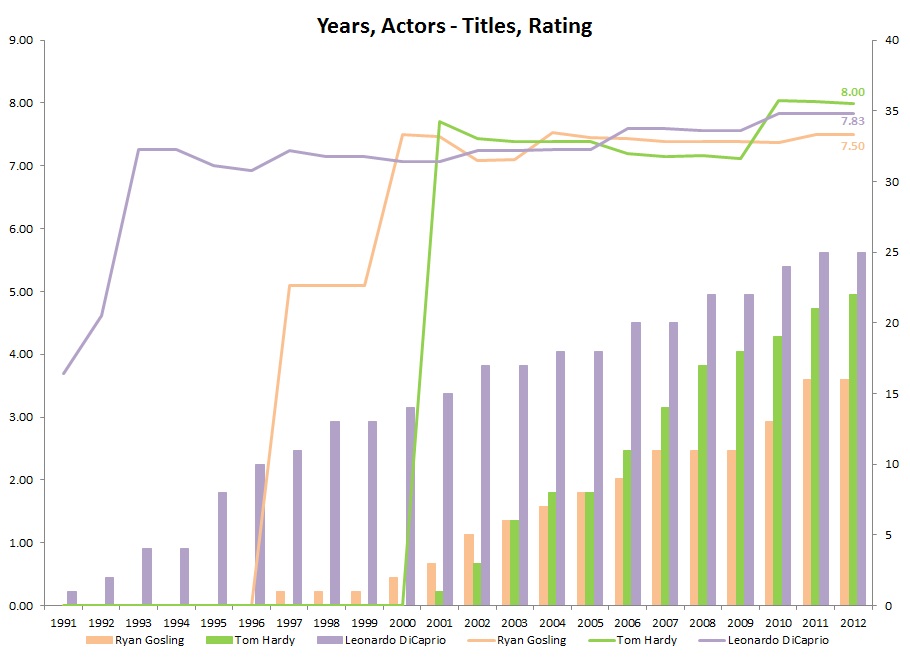
—————————————————————————————————————————————————————
Now instead of looking at movies across years, wherein it becomes slightly difficult to compare performances as different actors have debuted in different years, it makes sense to look at performances across number of titles.
Here we see that although Ryan Gosling has the lowest rating amongst the three at 7.50, it is still higher than what Leo or Tom had at the same number of titles being released, viz. 16. It is only at the 19th movie onwards, surprisingly for both Leo and Hardy, that their cumulative career movie ratings took a fillip and crossed the 7.50 mark. By this perspective, Ryan is well ahead of the two – however, only time will tell how his ratings fare over future releases.
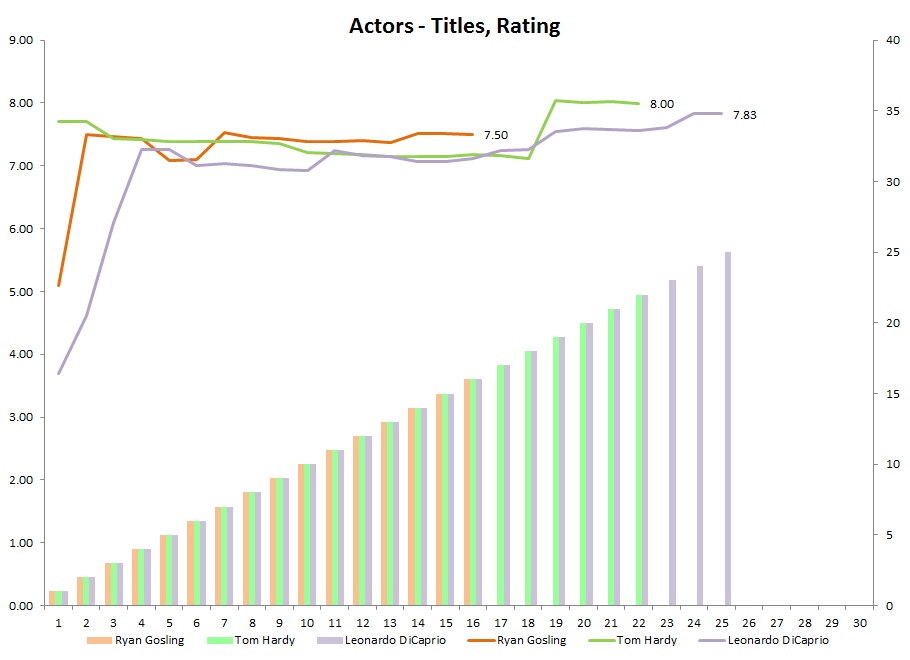
—————————————————————————————————————————————————————
Now when we look at Genres present for movies across IMDb, we find that there are 23 genres in all.
A quick distribution of movies in which these 3 actors have worked shows that Ryan Gosling has worked in movies that span across 11 genres, Leo across 12 genres and Tom Hardy across 15 genres.
Again, since movies do span multiple genres, we looked at the average count of genres spanned by movies done by these actors and found that Ryan Gosling has an average of 2.31 genres per movie, and Tom Hardy and Leonardo DiCaprio with 2.55 and 2.60 genres per movie respectively. This shows that Ryan Gosling’s movies individual movies span across fewer genres which could be a result of movie scripts that are more focused to certain genres.
It would be interesting to see if that could be a reason why his work’s ratings are the lowest amongst the trio at 7.50 and whether exploring movies across different genres could lead to an increase in overall performance ratings.
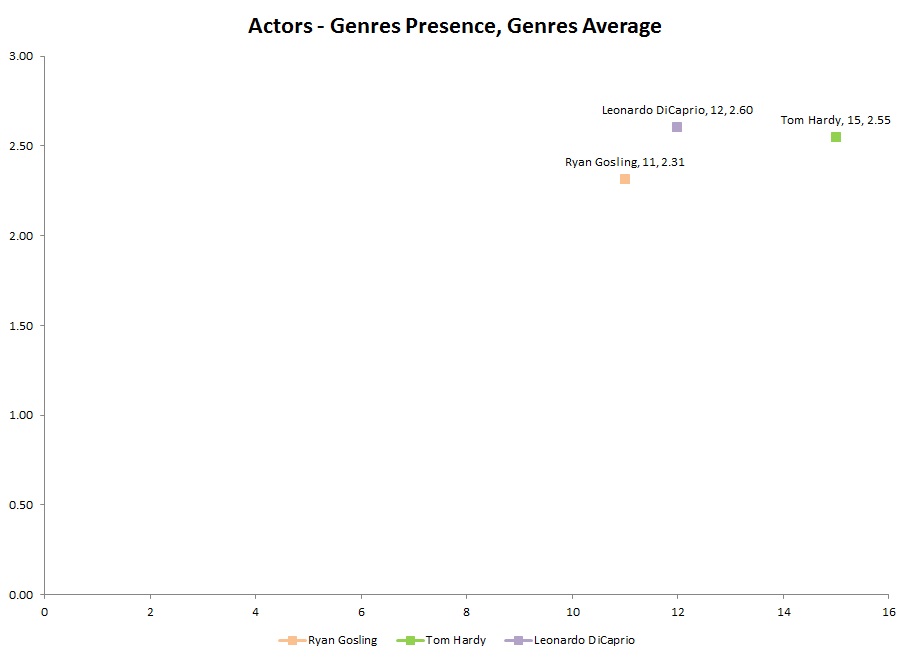
Note: An important point to be noted is that we have excluded Documentary, Short, TV series and TV movie in this study – as a result, since Documentary and Short are genres amongst the 23, it would effectively render this analysis applicable to only 21 genres as its universe.
—————————————————————————————————————————————————————
Then again, if you’re in the mood to watch a certain actor’s work, then a graph like this could help as it would show you which genre of movies has that actor done really good work in.
For example, Tom Hardy has a rating of
8.78 for Adventure (Minotaur, Inception),
8.65 for Sci-Fi (Star Trek: Nemesis, Inception) and
8.20 for Sport (Warrior).
Leonardo DiCaprio has a rating of
8.76 for Sci-Fi (Critters 3, Inception),
8.30 for Mystery (Shutter Island, The Departed) and
8.24 for Action (Body of Lies, Inception, The Man in the Iron Mask, The Quick and the Dead).
Strangely enough, none of the genres have a rating of more than 8.00 for Ryan Gosling.
His highest rated genre is
7.90 for War (The Notebook).
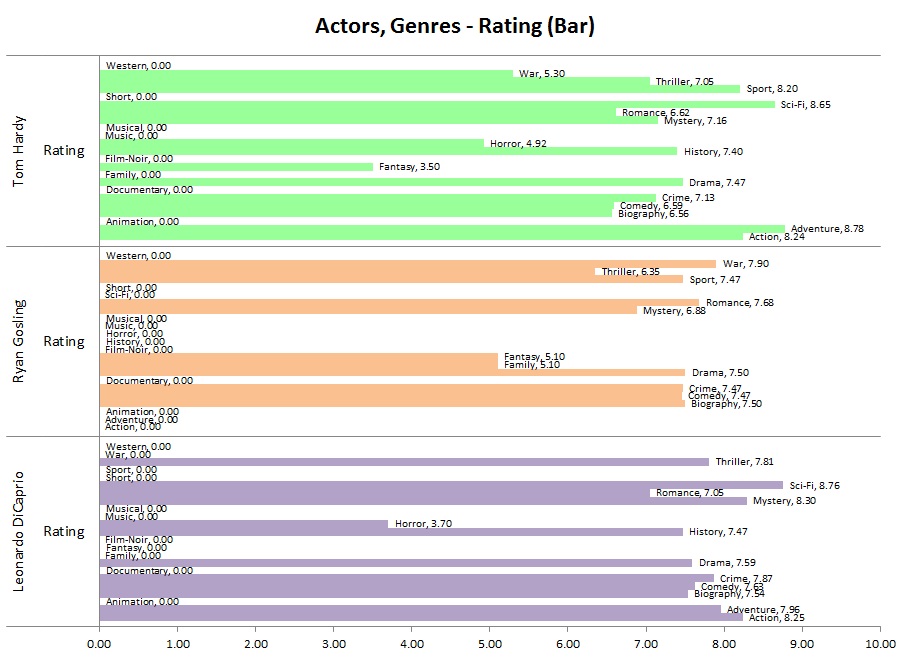
Note: It is important to still review the movies individually before watching – a weighted average here does not imply that all movies clubbed under these genres are equally good – it just implies that since the bad movies also have much fewer votes than the good movies, the overall weighted average rating of the genre still remains high.
—————————————————————————————————————————————————————
Also, if you are interested in genres being your primary choice, then you might want to look at a graph like this which not only shows you how these actors’ movies have fared in these genres compared to one another, but also which actors have chosen which genres.
All 3 fare almost equally well in Drama whereas DiCaprio fares much better than the others in Mystery and Thriller movies. Tom Hardy rates better at Adventure movies than DiCaprio but fares worse than both DiCaprio and Gosling in the genres of Biography, Comedy and Crime. Gosling fares better than the others in Romance and War. It is an almost equal match between DiCaprio and Hardy when it comes to History and Sci-Fi whereas Hardy fares better than DiCaprio in Horror (but both are quite bad with ratings below 5.0).
Apart from Documentary and Short (which have been excluded as part of this analysis), none of the 3 actors have done movies in the genres of Animation, Film-Noir, Music, Musical or Western.
Gosling has also stayed away from the genres of Action, Adventure, History, Horror and Sci-Fi (covered by DiCaprio and Hardy both).
Similarly, DiCaprio has never done a Fantasy, Sport or War movie (covered by Gosling and Hardy both).
When it comes to Hardy, the only genre he has not covered is Family, a genre in which only Gosling out of the 3 has a movie (Frankenstein and Me).
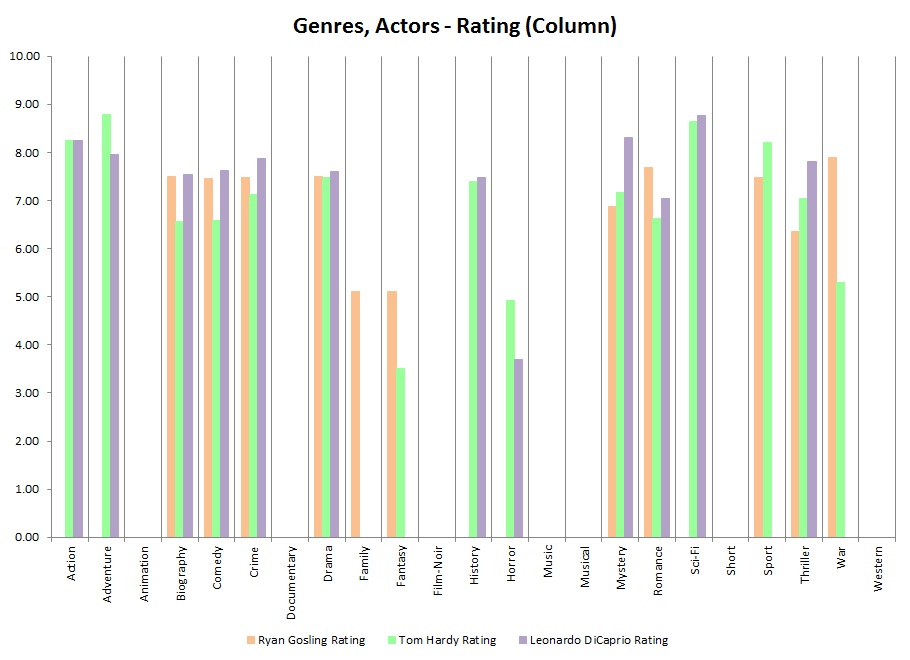
—————————————————————————————————————————————————————
I could go on and on – maybe look at differentiating credit due to a Director versus a Script Writer versus Actor versus Supporting Actor – how much weightage should each of them get for being associated with a movie. One simple way to do that for actors would be to look at their time on-screen (if it were made available) and apportion an appropriate weight of the movie rating based on that.
If so, then we could add these apportioned scores and measure the quantum of quality work that an individual has done. For example, Clint Eastwood would probably earn a lot of points as his long career has spanned not only acting but also directing some great movies. And it would also better reflect a long career as your score keeps increasing (by adding the apportioned credit due from each of your movies) instead of getting an averaged out rating irrespective of whether you’ve done 16 movies or 60.
Needless to say, I’m sure that a lot of you will want to check out Tom Hardy’s work now, apart from the fact that this post would have piqued your interest as to what is possible using IMDb’s repository of information.
From my point of view, it is now time to wait and watch to see when IMDb, if at all, goes ahead and provides fascinating insights into the quality of work done by the people in the industry.
And mark my words, the day IMDb does so, it will redefine the way the industry looks at itself – quality work will be appreciated for what it’s worth and natural selection will evolve to benefit the best talent that the industry has to offer – actors and movie stars will be more careful about what trash they sign up for as they will know that nothing spells doom like a hyped movie that fails at the box office (low rating, high vote count) – which will directly affect their possibility of getting good quality work in the future – which means sooner or later, all this will benefit us, the moviegoers who love nothing better than movies that take our collective breaths away.